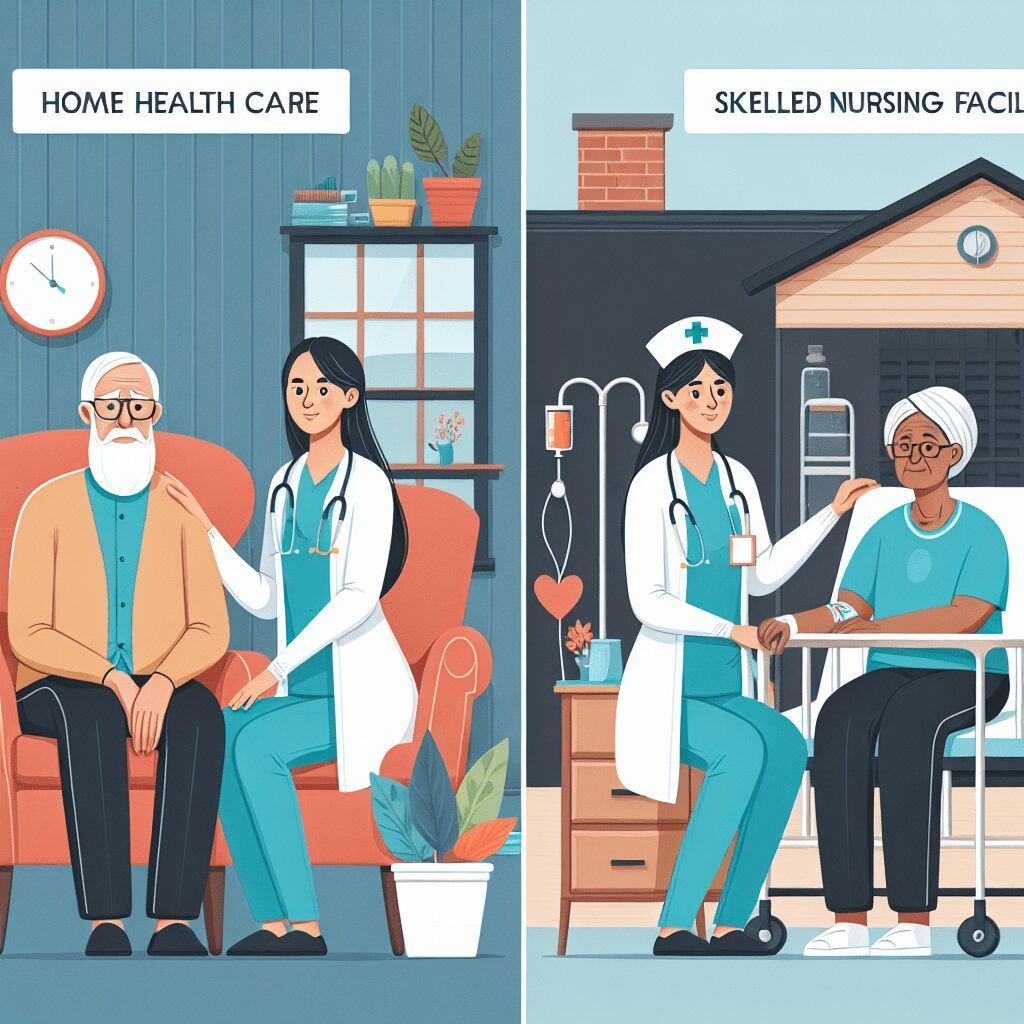Discovering the Purpose of SNF Services
Have you ever wondered about the different types of care facilities available to seniors? One option is skilled nursing facilities (SNFs). Understanding the purposes of SNF services can help you make informed decisions about your health and Medicare coverage.
SNFs offer various services, from transitional care to rehabilitation. These facilities play a vital role in helping individuals recover after an illness, injury, or surgery. Let’s explore the benefits of SNF services for those in need of skilled nursing care.
Understanding SNF Services
What is SNF used for?
Skilled Nursing Facilities offer 24-hour skilled nursing care. They also provide therapy services like physical and occupational therapy.
These facilities have specialized units for dementia residents. They administer injectable medications and focus on rehabilitation services such as gait training.
SNFs differ from other long-term care options, like nursing homes, by focusing on medical care that only licensed nurses can provide.
Patients who have had surgery, intensive treatment for acute conditions, or need intense rehabilitation after hospitalization benefit from SNF care.
This type of care is necessary for individuals needing specialized medical attention, monitoring, and therapies not available at home or in residential care.
Additionally, SNFs provide hospice services for individuals needing end-of-life care within a skilled nursing facility.
Defining Skilled Nursing Facility Services
Skilled nursing facilities provide 24-hour care and rehabilitation for residents with serious medical needs. Services include physical, occupational, and speech therapy to aid in recovery.
These facilities have units for dementia residents and can administer potent medications under supervision. Unlike nursing homes or assisted living, they focus on intensive medical attention.
Residents receive care from trained professionals like registered nurses and therapists, working closely with physicians on personalized plans. Medicare often covers these services after a hospital stay.
Skilled nursing facilities are crucial for supporting recovery from acute illnesses, promoting rehabilitation, and providing specialized medical care.
Exploring the Purpose of SNF Care
Skilled nursing facilities provide 24-hour nursing care and rehabilitative services to residents needing ongoing nursing care.
These facilities offer dietary, pharmaceutical, and recreational therapy to ensure residents’ well-being and comfort.
By focusing on rehabilitation like gait and bladder training, administering specialized medications, and treatments, they aim to improve patient outcomes after acute illnesses or injuries.
Additionally, skilled nursing facilities may offer hospice care through interdisciplinary teams for patients nearing the end of life.
With individualized care plans and state regulatory oversight, these facilities ensure comprehensive care and safety for residents transitioning from hospitals or needing specialized medical services for chronic conditions or post-acute care.
Benefits of SNF Services
Improving Patient Outcomes
Healthcare providers can help improve patient outcomes in skilled nursing facilities by focusing on specialized nursing care. Tailoring care plans to individual needs ensures residents receive skilled care, therapy, and medical equipment for recovery and well-being. Incorporating services like physical therapy, occupational therapy, and speech therapy can enhance rehabilitation outcomes for residents with acute illnesses or injuries.
Involving physicians in care planning ensures residents get appropriate medical attention. Technology plays a role in improving patient care in SNFs, with facilities using innovations to optimize healthcare delivery. Investing in modern methods and equipment can enhance services and resident well-being. Compliance with Medicare and Medi-Cal standards, as well as oversight by LTC Ombudsman programs, promotes quality care and protects residents from abuse or neglect in SNF settings.
Providing Specialized Nursing Care
Specialized nursing care in a skilled nursing facility can be improved by:
-
Implementing innovative techniques
-
Investing in staff training and development
-
Focusing on continuous innovation
-
Ensuring high standards in care delivery
By doing this, skilled nursing facilities can enhance:
-
Overall quality of services for residents
-
Use of advanced medical equipment
-
Adherence to evidence-based practices
-
Commitment to ongoing education for healthcare professionals
Specialized nursing care at SNFs is crucial for:
-
Promoting patient comfort and well-being
-
Offering tailored therapy and personalized care plans
-
Improving health outcomes and quality of life for residents
-
Creating a supportive and nurturing environment
Additionally, specialized nursing care can help:
-
Address staffing shortages
-
Provide necessary care and attention to residents
-
Optimize the use of available resources
-
Improve work satisfaction for staff members
-
Attract new healthcare professionals to SNFs
Quality of Care in Skilled Nursing Facilities
Ensuring Regulatory Compliance
Skilled nursing facilities (SNF) have rules to follow to meet regulations. Audits check that rules are followed for good care. If a problem is found, actions are taken quickly to fix it. This helps keep care standards high, ensuring residents are safe and well cared for. Following rules also affect Medicare coverage, showing how important it is to meet healthcare standards.
The Long-Term Care (LTC) Ombudsman Program also helps make sure regulations are kept and looks out for residents’ rights in SNF.
Promoting Patient Comfort and Well-being
Healthcare providers in skilled nursing facilities focus on promoting patient comfort and well-being. They offer skilled nursing care and rehabilitative services to aid in residents’ recovery post-hospital stay. Services like physical and occupational therapy help residents regain independence in daily activities.
SNFs provide a protective environment for individuals needing 24-hour skilled nursing care that is not manageable at home or in assisted living. Specialized units for dementia residents and medical treatments meet various healthcare needs. Rehabilitation, gait training, and bowel and bladder training aim to enhance residents’ quality of life.
For residents requiring hospice services, SNFs collaborate with interdisciplinary teams for comprehensive end-of-life care. State oversight by agencies like the LTC Ombudsman Program ensures regulatory compliance and addresses concerns of abuse or neglect. The array of services in SNFs contributes to enhancing patient comfort and well-being in a structured and supportive setting.
Challenges Faced by SNF Facilities
Addressing Staffing Shortages
Skilled nursing facilities can improve staffing shortages by hiring more registered nurses and nurse aides. This ensures 24-hour care for residents needing skilled assistance.
SNFs provide services like physical therapy for residents recovering from illnesses. Staff shortages in SNFs can impact the quality of care available to residents, limiting skilled care, medical equipment, and therapies.
SNFs must invest in new staffing methods and training to maintain high care standards. Participating SNFs must meet federal standards for Medicare and Medi-Cal residents, underscoring the need for adequate staffing to meet regulations and ensure quality care.
The Long-Term Care Ombudsman Program protects residents from abuse and neglect in SNFs. This emphasizes the importance of oversight for a safe and caring environment for residents.
Maintaining Facility Standards
The California Department of Public Health, Licensing and Certification Division upholds facility standards in skilled nursing facilities. They inspect facilities to check compliance with licensing standards and ensure that any issues are addressed promptly.
SNFs must also meet federal standards if they care for Medicare or Medi-Cal residents. This highlights the commitment to delivering high-quality care. Staff like doctors, nurses, and social workers are crucial in overseeing these standards. They create care plans to ensure residents get the necessary skilled care and services.
The Long-Term Care Ombudsman Program acts as a resident advocate, addressing concerns about abuse or neglect. This helps maintain the quality of care in SNFs.
Comparison of In-Home Skilled Nursing with SNF
In-home skilled nursing offers a personalized and flexible approach to patient care that is often more comforting and convenient than the care provided in a Skilled Nursing Facility (SNF). Patients receive one-on-one attention from healthcare professionals in their homes, allowing them to maintain their routines and stay in familiar surroundings. This setting can significantly enhance the emotional and psychological well-being of patients, particularly those nearing the end of life. Family members can be more involved in the care process, providing additional support and companionship, which can be a critical component of overall health and well-being.
In contrast, SNFs provide a structured environment with 24-hour medical support, which benefits patients needing intensive rehabilitation and continuous monitoring following a hospital stay. These facilities are equipped with specialized medical equipment and staffed by a team of healthcare professionals, ensuring that patients have immediate access to various therapies and treatments. However, the institutional setting of an SNF may feel less personal and homely, potentially impacting a patient’s comfort and happiness. While both in-home skilled nursing and SNFs offer essential services, their choice depends on the individual patient’s medical needs, personal preferences, and the level of care required.
Future Trends in SNF Services
Incorporating Technology for Improved Care
Technology is important in skilled nursing facilities for enhancing patient care and outcomes.
Advanced technology helps improve service delivery to residents by using specialized medical equipment and digital tools.
This integration allows for more effective monitoring of patient progress and better management of medical conditions.
It supports physicians in making informed decisions and ensures residents get the necessary care.
In rehabilitation services, technology helps create personalized therapy programs like physical and occupational therapy.
By using innovative tools, SNFs can optimize rehabilitation for residents recovering from acute illnesses or injuries.
Technology in SNFs improves the quality of care, leading to better patient outcomes and satisfaction.
Enhancing Rehabilitation Services
Enhancing rehabilitation services in skilled nursing facilities involves implementing innovative strategies.
Improving the quality of care for residents is a top priority.
Investing in technology, like specialized equipment for therapy, can make rehabilitation services more effective.
Staff training and development are crucial for supporting rehabilitative services.
Well-equipped nurses and therapists can better meet residents’ diverse needs.
Collaborating with physicians and healthcare professionals helps create personalized care plans.
These plans are tailored to each individual’s condition and rehabilitation goals.
Continuous innovation, advanced technology, and staff development are key factors.
These elements can significantly improve the quality of rehabilitation services in SNFs.
This, in turn, benefits residents’ recovery and well-being.
FAQ
What is the purpose of SNF services?
The purpose of SNF services is to provide skilled nursing care and rehabilitation therapy to individuals who are recovering from an illness, injury, or surgery with the goal of improving their physical, mental, and emotional well-being so they can regain independence and return to their prior level of functioning.
How can SNF services help individuals?
SNF services can help individuals by providing rehabilitation therapy, medical care, and assistance with daily activities after a hospital stay. This can help improve physical function and overall well-being, leading to a faster recovery and a higher quality of life.
What types of therapy are typically offered in SNF services?
Physical therapy, occupational therapy, and speech therapy are typically offered in SNF services. Physical therapy focuses on improving mobility and strength, occupational therapy helps with daily living skills, and speech therapy addresses communication and swallowing difficulties.
How can a person determine if they need SNF services?
A person can determine if they need SNF services by consulting with their healthcare provider and considering factors such as recent hospitalizations, difficulty with activities of daily living, and the need for rehabilitation services.
Are there specific criteria for receiving SNF services?
Yes, to receive SNF services, individuals must generally have a qualifying hospital stay of at least three days, require skilled nursing care on a daily basis, and have a doctor’s order for SNF services. Additional criteria may vary depending on individual circumstances.
Explore the essential role of Skilled Nursing Facility (SNF) services and how they differ from in-home care with ABET Life Home Health & Caregiving. While SNFs offer comprehensive medical and rehabilitative care, our in-home services provide the same level of personalized attention and professional care in the comfort and convenience of your home. Contact us today to learn how our tailored in-home care solutions can meet your healthcare needs effectively.
The post Discovering the Purpose of SNF Services first appeared on Home Health & Care Giving Service in Houston, TX.

Whether dealing with chronic illness or needing help recovering a surgery, ABET Life will support you with our focused care — covered by Medicare or other insurance carriers for qualified patients.
USEFUL LINKS
All Rights Reserved | AbetLife, Inc | Terms of Use | Privacy Policy











